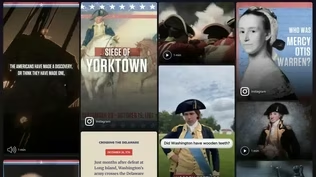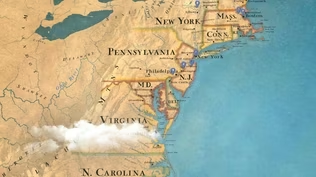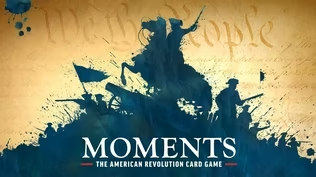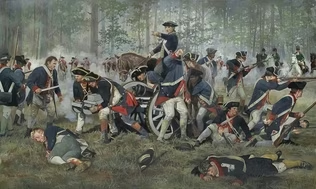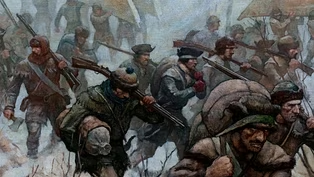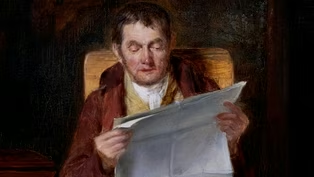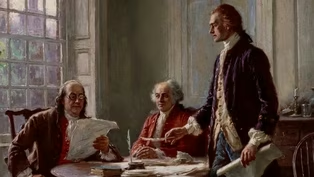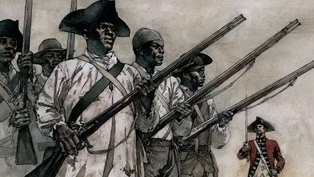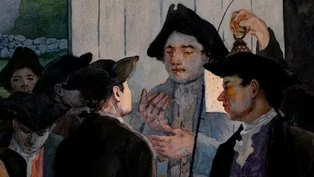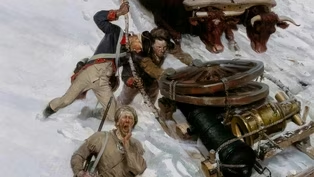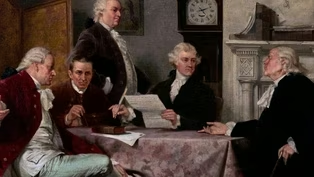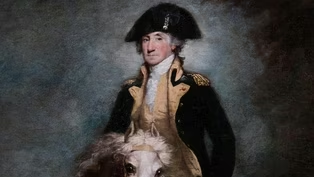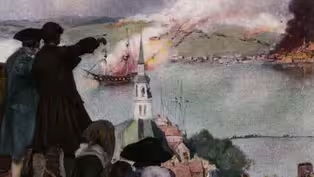
George Washington: Farmer, Patriot, Commander
Clip: Episode 2 | 4m 56sVideo has Closed Captions
George Washington assumes command of the Continental Army and must turn it into a unified force.
In the spring of 1775, George Washington accepts the role as the Commander-in-Chief of the Continental Army. Washington is 43 years old, one of the richest men in America and the enslaver of over 300 people. He is an imposing figure with an adhesive memory and the ability to instill confidence in his subordinates. His first task is to turn a ragtag group of Patriots into a fighting army.
Problems playing video? | Closed Captioning Feedback
Problems playing video? | Closed Captioning Feedback
Episodes presented in 4K UHD on supported devices. Corporate funding for THE AMERICAN REVOLUTION was provided by Bank of America. Major funding was provided by The Better Angels Society and...

George Washington: Farmer, Patriot, Commander
Clip: Episode 2 | 4m 56sVideo has Closed Captions
In the spring of 1775, George Washington accepts the role as the Commander-in-Chief of the Continental Army. Washington is 43 years old, one of the richest men in America and the enslaver of over 300 people. He is an imposing figure with an adhesive memory and the ability to instill confidence in his subordinates. His first task is to turn a ragtag group of Patriots into a fighting army.
Problems playing video? | Closed Captioning Feedback
How to Watch The American Revolution
The American Revolution is available to stream on pbs.org and the free PBS App, available on iPhone, Apple TV, Android TV, Android smartphones, Amazon Fire TV, Amazon Fire Tablet, Roku, Samsung Smart TV, and Vizio.
Buy Now
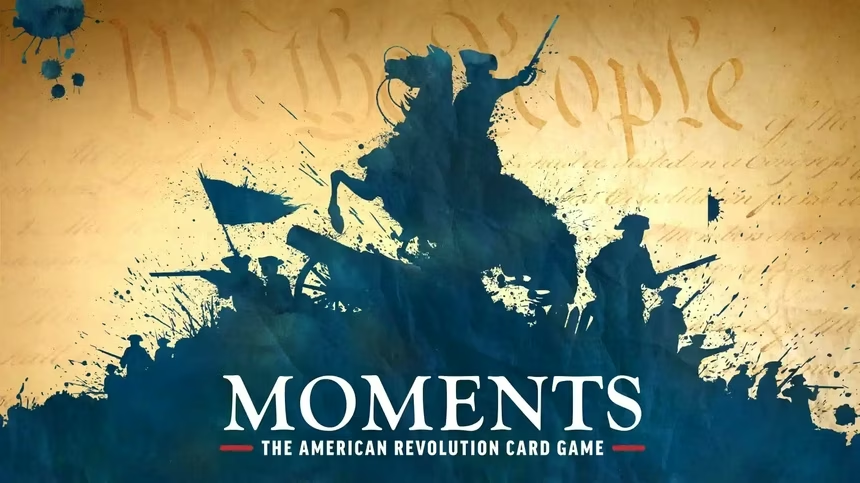
MOMENTS: The Revolutionary War Card Game
Use your knowledge of Revolutionary-era moments to build a timeline of real historical events.Providing Support for PBS.org
Learn Moreabout PBS online sponsorship[Thunder] Voice: Unhappy it is to reflect that a brother's sword has been sheathed in a brother's breast, and that the once happy and peaceful plains of America are either to be drenched with blood or inhabited by slaves.
Sad alternative!
But can a virtuous man hesitate in his choice?
George Washington.
Narrator: On July 2nd, 1775, Private Phineas Ingalls of Andover, Massachusetts, noted in his diary that it "rained" and that "a new general from Philadelphia" had arrived in Cambridge.
That new general was George Washington of Virginia, the commander of the Continental Army the Congress in Philadelphia had just created.
His arrival meant that the New England war in which Phineas Ingalls and his fellow militiamen had joined was about to become an American war.
Jane Kamensky: Washington is a figure toward whom people naturally turn for leadership.
It is clear, by the time the Continental Army is signed into being in the late spring of 1775, that its commander-in-chief can be nobody else.
There's something about his presence that makes him the inescapable choice.
[Bell ringing] Narrator: The Second Continental Congress had been meeting since May, and it was obvious from the first that 43-year-old George Washington would command its new army.
He had led troops during the French and Indian War, and he was from Virginia, the wealthiest and most populated colony.
New England delegates, eager to ensure that colony's support for the war, favored naming a Virginian.
Washington was also one of America's richest men, the beneficiary of the work of scores of indentured servants and more than 100 enslaved people at his plantation on the Potomac River-- Mount Vernon.
They grew tobacco and wheat, corn and flax and hemp, milled flour, distilled whiskey, caught, salted, and sold fish.
And to the West, he had amassed tens of thousands of acres of Indian lands.
Washington has this vision of the future in which...America's future is not to the East, not towards Europe.
It's to the West.
He does see the future and the next century as something in which we should focus on the consolidation of the continent.
Hogeland: What defines his early career is an amazing focus, a ruthless and intense focus, on his own interests, which makes him exactly like every other member of his class.
It's just that he became George Washington.
Narrator: Washington considered outward evidence of ambition unseemly, but his appearance alone made him stand out in Philadelphia.
He was about 6'3" when the average height of the men he would lead into battle was around 5'7", and he alone among the delegates appeared each day dressed as a soldier.
Hogeland: Washington will remain, I think, endlessly fascinating.
Partly because he was so mysterious, so reserved in his manner, frequently, and didn't give up a lot of what was going on in his gut.
♪ Ellis: He was naturally a person who created space around himself, and pity anybody that enters that space that's not invited.
Martha gets into that space.
Lafayette gets into that space.
Maybe Hamilton gets into that space.
Voice: He has so much martial dignity in his deportment that you would distinguish him to be a general and a soldier from among 10,000 people.
There is not a king in Europe that would not look like a "valet de chambre" by his side.
Benjamin Rush.
He's got a brain built for executive action.
He's willing to take responsibility.
He's got an adhesive memory.
He is, according to Thomas Jefferson, the greatest horseman of his age.
He's built to lead other men in the dark of night, which is a rare and valuable trait in any commander.
Voice: I am now embarked on a tempestuous ocean, from whence, perhaps, no friendly harbor is to be found.
♪
Video has Closed Captions
Clip: Ep2 | 8m 18s | Benedict Arnold's army braves the fierce winter to attack Quebec City in Canada. (8m 18s)
"Common Sense" and the Birth of a New World
Video has Closed Captions
Clip: Ep2 | 6m 36s | "Common Sense" awakens the American colonies to the idea of true independence. (6m 36s)
The Declaration of Independence & Birth of the United States
Video has Closed Captions
Clip: Ep2 | 11m 47s | Thomas Jefferson writes the Declaration of Independence and proclaims all men are created equal. (11m 47s)
Dunmore's Proclamation & Black Americans in the Revolution
Video has Closed Captions
Clip: Ep2 | 9m 20s | Royal governor Lord Dunmore offers freedom to enslaved people that fight their Patriot masters. (9m 20s)
John Peters... an enemy to Congress?
Video has Closed Captions
Clip: Ep2 | 2m 5s | John Peters was the most respected man in his small settlement until the First Continental Congress. (2m 5s)
One of the Most Extraordinary Expeditions in American History
Video has Closed Captions
Clip: Ep2 | 6m 56s | Henry Knox leads a daring expedition to deliver artillery from Fort Ticonderoga to Boston. (6m 56s)
Preview: An Asylum for Mankind
Video has Closed Captions
Preview: Ep2 | 30s | Washington takes command of the Continental Army. Congress declares American independence. (30s)
Video has Closed Captions
Clip: Ep2 | 52s | Extolling Washington's qualities in leadership, command and mental faculties. (52s)
Bunker Hill Aftermath, June 17, 1775
Video has Closed Captions
Clip: Ep2 | 57s | On June 17, 1775, the British took the high ground, but at tremendous cost. (57s)
Providing Support for PBS.org
Learn Moreabout PBS online sponsorshipSupport for PBS provided by:
Episodes presented in 4K UHD on supported devices. Corporate funding for THE AMERICAN REVOLUTION was provided by Bank of America. Major funding was provided by The Better Angels Society and...

